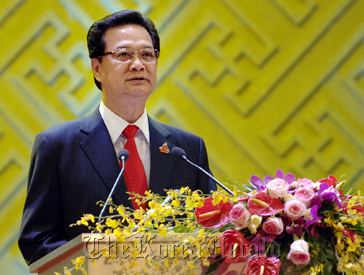The Vietnamese Prime Minister Nguyen Tan Dung was officially inaugurated on June 27, 2006. He has proved his capability to lead the country and overcome many difficulties to ensure social security and the stability of Vietnamese people’s income be maintained and to develop Vietnam to a new high level, despite the fact that Vietnam has been facing many difficulties and is still poor ― a country undergoing many wars.
 |
P.M. Nguyen Tan Dung |
In external affairs and international and regional events, he has gained substantial success and credit in the international arena.
The Vietnamese government is particularly concerned with matters of social security and community welfare. Prime Minister Nguyen Tan Dung has guided the ministries, branches and local governments to prioritize resources to implement existing programs, projects and policies to support the poor and those benefiting from social policies to minimize their difficulties due to high inflation.
For the first half of 2011, Vietnam has spent more than 9,000 billion VN dong ($437 million) on financial aid to officers, employees, armed forces, low-wage pensioners, people with incentive allowances and the poor; raised the amount of money paid for meal expenses of soldiers, supported the poor when adjusting the electricity prices; readjusted the salary scale, social insurance benefits for officers, employees, the armed forces, pensioners and people benefiting from social policies; exempted tuition fees and other kinds of educational support; readjusted the minimum wage for employees working in enterprises; readjusted the social policies towards the old, raised the allowance rate.
As a result, about 600,000 people get their allowances regularly. In addition, the Vietnamese government has also put in place a package of supporting policies for seven provinces with high rates of poor families and applied similar policies for infrastructure investments to 62 poor districts. Moreover, over the first six months of 2011, more than 720,000 jobs have been created.
The Vietnamese government brought back all the labors working in Libya back home just in time and safely. Then those workers have been assisted to gradually stabilize their lives. National programs on building renovated country areas have been formulated and implemented.
The credit rate of student loans has been increased. The balance of debt on loans of national programs and social security policies as of June 30, 2011 is estimated at nearly 95 trillion dong, increasing 13.7 percent. More than 56,000 tons of rice has been used for food aid to help people overcome the influences of natural disasters, increased by 9 percent over the same period of last year. The government has set new definitions of poverty and near-poverty in the period from 2011 to 2015 and worked out sustainable methods to reduce poverty from 2011-2020.
Prime Minister Nguyen Tan Dung has defined the key tasks of the government for the next six months of 2011. They call for making further efforts to carry out the mission on social security set out for 2011 including the creation of 1.6 million jobs for laborers, a 2 percent decrease in poverty rate according to the new definition, including a 4 percent decline in 62 poor districts.
Under the guidelines, the government will focus on implementing social welfare policies and programs, which are directed toward the poor countryside, locations with special difficulties, poor people and those who have scarified for the country. The government will continuously direct the implementation of investment projects, financial aid in funding housing construction for the people with serious difficulties and the programs of renovation in the countryside. The plan to raise the minimum wage in the corporate sector, active from Oct. 1, 2011, must be resolutely implemented.
The government has decided to permit delayed payment of the corporate income tax in 2011 of about 13 trillion dong and will present to the Congress a plan that calls for the consideration of the exemption and reduction of the enterprise income tax and personal income tax of 7 trillion dong. The Vietnamese government will concentrate on fixing social problems which the workers have to cope with in the enterprise’s working environments.
Additionally, the basic social services related to health and education will be organized in a more effective way. The government will also allocate national resources to natural disaster prevention, production recovery and life stability in disaster areas. Finally, the Vietnamese government will keep on reviewing, amending and promulgating new policies and programs to improve the social security systems to be applied for the period of 2011 to 2015.
Vietnam has achieved remarkable economic success in recent years, especially during the term of Prime Minister Nguyen Tan Dung. Thanks to his skillful leadership, Vietnam has transformed from low income to middle income country with GDP per capita of $1,160. During his tenure, the economy in Vietnam has grown continuously, even under the impact of the global economic crisis. Dung has also showcased his outstanding capabilities of handling controversial issues such as Vinasin case, bauxite mines and guiding the country in the right direction while balancing between economic growth and inflation control at the same time. The prime minister has made right decisions regarding macroeconomic stability, sacrificing economic growth (GDP estimated to be 5.57 percent for the first six months of 2011) for a reduction in inflation, macroeconomic and social security, which have gained agreement and support from all levels of people, enterprises, financial institutions and international community.
He deserves to be seen as one of the most excellent prime ministers in Asian countries.
By Lee Min-ho (President of Kindmatic Co., Ltd.)








